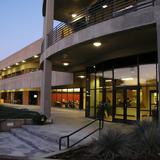- Lane is the community`s college: we provide comprehensive, accessible, quality, learning-centered educational opportunities that promote student success and include professional technical and lower division college transfer programs; employee skill upgrading, business development and career enhancement; foundational academic, language and life skills development; lifelong personal development and enrichment; and cultural and community services.
School Highlights
Lane Community College serves 11,433 students (14% of students are full-time).
The college's student-teacher ratio of 18:1 is lower than the state community college average of 21:1.
Minority enrollment is 37% of the student body (majority Hispanic), which is less than the state average of 47%.
Quick Facts (2026)
- Enrollment: 11,433 students
- In-state tuition: $4,794
- Out-state tuition: $10,428
- Student-teacher ratio: 18:1
- Minority enrollment: 37%
- Source: Verified school update
Top Rankings
Lane Community College ranks among the top 20% of public schools in Oregon for:
Category
Attribute
Community Size
School Overview
The teacher population of 652 teachers has stayed relatively flat over five years.
Lane Community College
(OR) Community College Avg.
Carnegie Classification
Associate's Colleges: High Transfer-High Nontraditional
Not applicable, not in Carnegie universe (not accredited or nondegree-granting)
Institution Level
At least 2 but less than 4 years
At least 2 but less than 4 years
Institution Control
Public
Private not-for-profit
Total Faculty
652 staff
192 staff
School Calendar
Student Body
The student population of Lane Community College has grown by 48% over five years.
The student-teacher ratio of 18:1 has decreased from 27:1 over five years.
The Lane Community College diversity score of 0.57 is less than the state average of 0.66. The school's diversity has grown by 5% over five years.
Total Enrollment
11,433 students
2,463 students
Student-Teacher Ratio
18:1
21:1
# Full-Time Students
1,639 students
310 students
# Part-Time Students
9,794 students
2,153 students
# Enrollment Undergraduate
114 students
339 students
# Full-Time Undergraduate Students
1,639 students
310 students
# Full-Time Graduate Students
n/a
193 students
# Part-Time Undergraduate Students
9,794 students
2,589 students
# Part-Time Graduate Students
n/a
153 students
Total Dormitory Capacity
270 students
270 students
% American Indian/Alaskan
1%
1%
% Asian
3%
5%
% Hispanic
16%
20%
% Black
2%
3%
% White
63%
53%
% Hawaiian
n/a
1%
% Two or more races
7%
5%
% Non Resident races
2%
1%
% Unknown races
5%
11%
Diversity Score
0.57
0.66
College Completion Rate (Students who graduate in less than 4 years)
24%
42%
College Completion Rate (Students who graduate in 4 years or more than 4 years)
n/a
58%
Average Graduate Earnings (10 Years)
$32,700
$33,800
Tuition and Acceptance Rate
The public in-state tuition of $4,794 is more than the state average of $4,172. The in-state tuition has declined by 6% over four years.
The public out-state tuition of $10,428 is more than the state average of $6,738. The out-state tuition has stayed relatively flat over four years.
In-State Tuition Fees
$4,794
$4,172
Out-State Tuition Fees
$10,428
$6,738
% Students Receiving Some Financial Aid
65%
79%
Median Debt for Graduates
$15,424
$12,875
Median Debt for Dropouts
$5,834
$6,334
Acceptance Rate
n/a
100%
Sports
Total Sports Offered
6 sports
Sports
BaseballBasketball
Cross CountrySoccer
Track and FieldVolleyball
Source: 2024 (or latest year available) Integrated Postsecondary Education Data System (IPEDS)
School Notes
- Lane was founded in 1964, the main campus opened in 1968. The college was a successor to the Eugene Technical-Vocational School that ws founded in 1938. Lane has been rated one of the top two-year colleges in America and has received many awards and accolades for its innovative programs and high quality instruction. In 2000 Lane was selected by the League for Innovation as one of 12 Vanguard Learning Colleges in North America for its outstanding record of achievement and innovation in improving learning. Lane Community College is a comprehensive community college. The college offers a wide variety of instructional programs including transfer credit programs, professional technical degree and certificate programs, continuing education noncredit courses, programs in English as a Second Language and International ESL, GED programs, and customized training for local businesses. Classes are offered at many locations, and online classes and telecourses are also available. Lane Community College is a comprehensive community college offering professional technical and lower division college classes. The college offers classes at a number of locations in addition to the main campus. These include the Downtown Center in Eugene, Lane Community College at Florence, Lane Community College at Cottage Grove, and the Aviation Academy at the Eugene Airport. In addition to weekday classes, Lane offers some evening and Saturday classes, as well as many online offerings.
Frequently Asked Questions
How much does Lane Community College cost?
Lane Community College's tuition is approximately $4,794 for In-State students and $10,428 for Out-State students.
What sports does Lane Community College offer?
Lane Community College offers 6 interscholastic sports: Baseball, Basketball, Cross Country, Soccer, Track and Field and Volleyball.
What is Lane Community College's ranking?
Lane Community College ranks among the top 20% of community college in Oregon for: Largest student body.
Recent Articles

Community College Policies and Financial Aid Guide 2026
A 2026 guide to community college policies and financial aid, including FAFSA updates, state aid, tuition rules, and smart planning tips.

Get Better Grades in Community College by Being Social (2026 Update)
Learn how being social in community college boosts grades, retention, and career success. Updated 2026 strategies for academic achievement.

Navigating Community College as an Adult Learner in 2026
A practical 2026 guide for adults returning to community college, covering admissions, financial aid, career planning, and flexible learning options.












